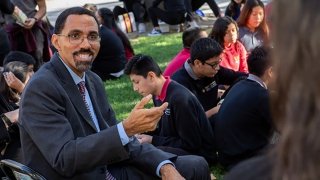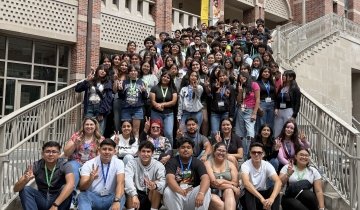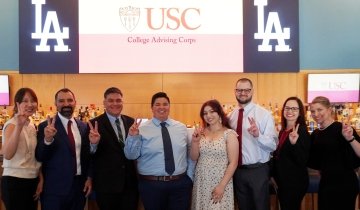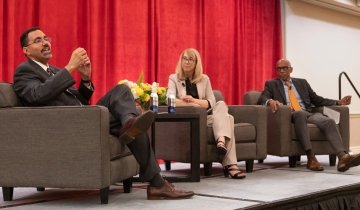When he was young, John B. King Jr. was often sad and frustrated.
King, now the president and CEO of The Education Trust and former U.S. Secretary of Education under Barack Obama, delivered the USC Rossier Centennial Lecture on Wednesday, drawing on his experiences growing up in New York City to show how educators can make a difference.
In his childhood, King said, he was often angry at adults, angry at his parents, angry at society. His mother passed away when he was eight years old, and his father battled undiagnosed Alzheimer’s.
King reflected on how hardship and inequity manifest on an individual level, and how they almost derailed his future but for the efforts of educators in New York City public schools.
“I’m the first U.S. Secretary of Education to get kicked out of high school,” King said. “But I hope I’m not the last, because part of why I’m standing here is because people were willing to give me a second chance. People were willing to see me as more than the sum of my mistakes. They were willing to see potential and possibility.”
Teaching for social justice
Discussing continued disparities in education, King noted examples of USC Rossier’s efforts toward addressing some of those disparities, including the work done at USC Hybrid High, Ednovate with USC Rossier, a school founded by USC Rossier in 2012.
The first three senior classes from that school have all had 100 percent graduation rates and college acceptance rates, and at King’s speech, 140 juniors from that school and the Alliance for College-Ready Public Schools listened to King describe how educators can address the inequities that many students experience.
King said that educators can be activists for educational equity in three ways: Teaching for social justice; empowering others in the social justice movement; and loving their students.
Laying out the challenges that many students face—hunger, crumbling schools, hateful and racist rhetoric, doubts about belonging—King said that educators had to challenge themselves to see their students’ full humanity.
“I was blessed to have a series of teachers in New York City public schools who made school so compelling and interesting and engaging,” he said.
Following his speech, King, along with Karen Symms Gallagher, the Emery Stoops and Joyce King Stoops Dean of USC Rossier, met with the students from the audience over lunch, taking questions and expanding on the themes he had discussed earlier. Many came from similar backgrounds as King. And as he demonstrated, any of them can share a similar future.




